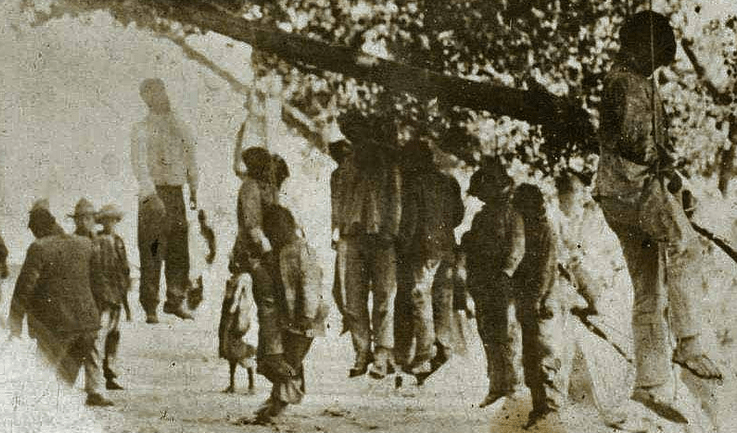General Discussion
Related: Editorials & Other Articles, Issue Forums, Alliance Forums, Region ForumsBlack History: day 24 - America's Forgotten Mass Lynching, 237 A/A Murdered In Arkansas
Last edited Sun Apr 19, 2020, 10:14 AM - Edit history (1)
237 Black People Were Murdered In Arkansas:America’s Forgotten Mass Lynching
https://sungod64.wordpress.com/2018/02/24/237-black-people-were-murdered-in-arkansasamericas-forgotten-mass-lynching/


 ?w=737&h=1&crop=1
?w=737&h=1&crop=1
In 1919, in the wake of World War I, black sharecroppers unionized in Arkansas, unleashing a wave of white vigilantism and mass murder that left 237 people dead.
DAVID KRUGLER
The visits began in the fall of 1918, just as World War I ended. At his office in Little Rock, Arkansas, attorney Ulysses S. Bratton listened as African American sharecroppers from the Delta told stories of theft, exploitation, and endless debt. A man named Carter had tended 90 acres of cotton, only to have his landlord seize the entire crop and his possessions. From the town of Ratio, in Phillips County, Arkansas, a black farmer reported that a plantation manager refused to give sharecroppers an itemized account for their crop. Another sharecropper told of a landlord trying “to starve the people into selling the cotton at his own price. They ain’t allowing us down there room to move our feet except to go to the field.”
No one could know it at the time, but within a year these inauspicious meetings would lead to one of the worst episodes of racial violence in U.S. history. Initiated by whites, the violence—by any measure, a massacre—claimed the lives of 237 African Americans, according to a just released report from the Equal Justice Initiative. The death toll was unusually high, but the use of racial violence to subjugate blacks during this time was not uncommon. As the Equal Justice Initiative observes, “Racial terror lynching was a tool used to enforce Jim Crow laws and racial segregation—a tactic for maintaining racial control by victimizing the entire African American community, not merely punishment of an alleged perpetrator for a crime.” This was certainly true of the massacre in Phillips County, Arkansas.
Bratton agreed to represent the cheated sharecroppers, who also joined a new union, the Progressive Farmers and Household Union of America. Its founder, a black Delta native named Robert Hill, had no prior organizing experience but plenty of ambition. “The union wants to know why it is that the laborers cannot control their just earnings which they work for,” Hill announced as he urged black sharecroppers to each recruit 25 prospective members to form a lodge. Hill was especially successful in Phillips County, where seven lodges were established in 1919.
It took a lot of courage to defy the Arkansas Delta’s white elite. Men such as E.M. “Mort” Allen controlled the local economy, government, law enforcement, and courts. Allen was a latter-day carpetbagger, a Northerner who had come to Arkansas in 1906 to make his fortune. He married well and formed a partnership with a wealthy businessman. Together they developed the town of Elaine, a hub for the thriving lumber industry. Allen and the county’s white landowners understood that their continued prosperity depended on the exploitation of black sharecroppers and laborers. In a county where more than 75 percent of the population was African American, this wasn’t a task to be taken lightly. In February 1919, the planters agreed to reduce the acreage of cotton in cultivation in anticipation of a postwar drop in demand. If they gave their tenants a fair settlement, their profits would shrink further. Allen spoke for the planters when he declared that “the old Southern methods are much the best,” and that the “Southern men can handle the negroes all right and peaceably.”
BSdetect
(8,999 posts)Demovictory9
(32,472 posts)rockfordfile
(8,704 posts)marble falls
(57,172 posts)were a terrible time here for civil rights.
madaboutharry
(40,219 posts)It is not shocking to me to see such a photograph, but there are others who may want the choice of not seeing it.
I very much appreciate your post.
marble falls
(57,172 posts)any photo pales in the light of the obscenity in obscuring the history of the unpunished murders of 200 and more of men, women and children.
Studies by the University of Arkansas using comparisons of the 1910 census and the 1920 census and following all individual listed as far as possible suggests the population of A/A in Phillips county was reduced by as much as 80%.
HipChick
(25,485 posts)These injustices are appalling....
malaise
(269,157 posts)speak to the evil that is racism in the USA
marble falls
(57,172 posts)malaise
(269,157 posts)NurseJackie
(42,862 posts)I'm horrified and heartbroken.